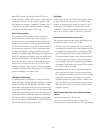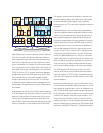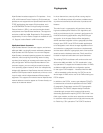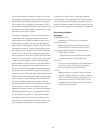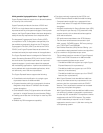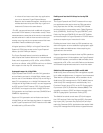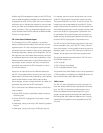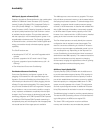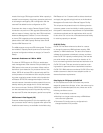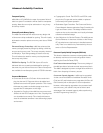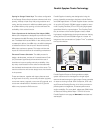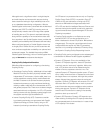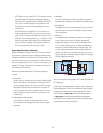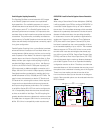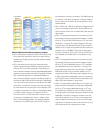38
z890 Capacity Upgrade on Demand (CUoD)
Capacity Upgrade on Demand allows for the nondisruptive
addition of additional Central Processor (CP) Capacity,
Internal Coupling Facilities (ICFs), Integrated Facility for
Linux (IFLs) and/or IBM ^ zSeries Application
Assist Processor (zAAP). Capacity Upgrade on Demand
can quickly add processors up to the maximum number
of available inactive engines. This provides customers
with the capacity for much needed dynamic growth in an
unpredictable e-business world. The Capacity Upgrade
on Demand function, combined with Parallel Sysplex tech-
nology, can enable virtually unlimited capacity upgrade
capability.
The CUoD functions are:
• Nondisruptive CP, ICF, IFL, and zAAP upgrades within
minutes
• Dynamic upgrade of all I/O cards in the I/O Cage
• Dynamic upgrade of spare installed memory (24 - 32
GB only)
• Plan Ahead and Concurrent Conditioning
Plan Ahead and Concurrent Conditioning
Concurrent Conditioning confi gures a system for hot
plugging of I/O based on a future specifi ed target con-
fi guration. Concurrent Conditioning of the zSeries I/O is
minimized by the fact that all I/O cards plugging into the
zSeries I/O cage are hot pluggable. This means that the
only I/O to be conditioned is the I/O cage itself. The ques-
tion of whether or not to concurrently condition a cage is
a very important consideration, especially with the rapid
change in the IT environment (e-business) as well as the
technology. Migration to FICON Express/FICON Express2
or additional OSA-Express/OSA-Express2 networking is
exceptionally easy and nondisruptive with the appropriate
microcode load and if the cage space is available.
The z890 supports concurrent memory upgrade. This capa-
bility will allow a processor’s memory to be increased without
disrupting the processor operation. To take advantage of this
capability, a customer should not plan processor storage
on the 8 or 16 GB increments. A customer with a Model A04
with 24 GB of storage will be able to concurrently upgrade
to 32 GB as there is spare memory capacity on the card.
However, for a customer with 8 or 16 GB of memory installed
getting to the next increment would be disruptive.
The Plan Ahead process can easily identify the customer
confi guration that is required to meet future needs. The
result of concurrent conditioning is a fl exible IT infrastruc-
ture that can accommodate unpredictable growth in a low
risk, nondisruptive way. Depending on the required Con-
current Conditioning, there should be minimal cost associ-
ated with dormant z890 capacity. This creates an attractive
option for businesses to quickly respond to changing
environments, bringing new applications online or growing
existing applications without disrupting users.
z890 Server Capacity BackUp (CBU)
Capacity BackUp (CBU) is offered with the z890 servers
to provide reserved emergency backup CPU capacity for
situations where customers have lost capacity in another
part of their establishment and want to recover by adding
reserved capacity on a designated z890 server. A CBU
system normally operates with a “base” CP confi guration
and with a preconfi gured number of additional Processor
Units (PUs) reserved for activation in case of an emergency
.
The z890 technology is suited for providing capacity backup.
The reserved CBU processing units are on the same technol-
ogy building block, the MCM, as the regular CPs.
The “base” CBU confi guration must have suffi cient
memory and channels to accommodate the potential
Availability



